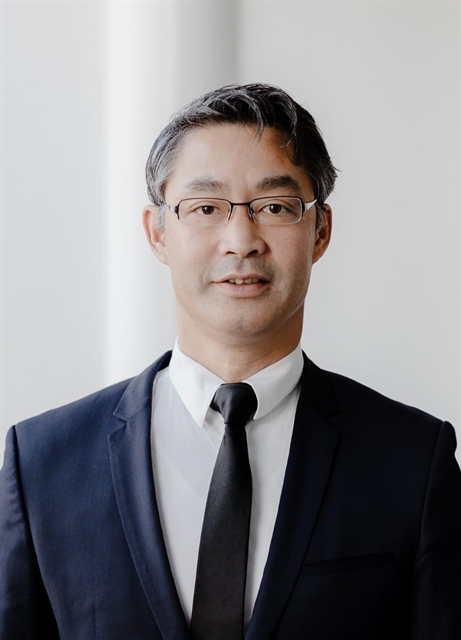The Vietnamese are hard-working, disciplined and entrepreneurial in their thinking – the very virtues that make a society strong. Without them, even large economies are threatened with decline.

Dr Philipp Rösler*
The Vietnamese are hard-working, disciplined and entrepreneurial in their thinking – the very virtues that make a society strong. Without them, even large economies are threatened with decline.
Every time I land in HCM City, I am fascinated by the view: the high-rises, especially the illuminated Landmark 81 skyscraper, the second-tallest building in Southeast Asia, never fail to impress me. Even during the final approach, you can almost feel the city’s dynamism.
All the more, I regret that so few people are familiar with modern-day Việt Nam, or, to put it differently, that so many still carry an image of the country shaped by the music, reports and films of the 1960s and 70s during wartime.
That image may have been justified until 1986. Still, it has long since ceased to reflect the realities of life in Việt Nam, especially since the country began opening its economy under the Đổi Mới (Renewal) reforms. This process of opening made rapid economic growth possible and has given rise to a strong and still expanding middle class.
In 1986, Việt Nam had around 60 million inhabitants. Today, there are 100 million Vietnamese. And while the country’s GDP stood at US$27 billion back then, it is expected to reach $500 billion this year. However, people are more important than numbers. The population figure of 100 million is impressive in its own right.
Additionally, the average age is approximately 33, underscoring the dynamism, potential and opportunities of Vietnamese society. Above all, it is Việt Nam’s young generation that inspires.
Nowhere in the world is there a population group as entrepreneurial in spirit as the young people of this country. Wherever you look, in every street and on every corner, there are small shops, restaurants and businesses. Almost every family is engaged in some form of entrepreneurial activity.
Introducing private ownership as part of the Đổi Mới economic reforms unleashed forces that have made Việt Nam’s growing prosperity over the past forty years possible. This development was supported by smart decisions made by the Party as well as the Government.
That leadership observed comparable economic developments worldwide and then, although initially cautious, ultimately implemented them decisively. This explains the relatively slow and at times hesitant privatisation, as well as the steady push for digitalisation at all levels.
While in Germany people still worry about mobile reception every time they take a train, even in the Mekong Delta in southern Việt Nam, there is at least 3G, and often 4G coverage in every rice field.
And for good reason: agriculture still contributes around 33 per cent to the country’s GDP and remains an important economic sector, even in 2025 – and it's highly modern and digital.
Formerly State-run agricultural cooperatives have long since evolved into publicly listed companies, some of which comprise up to 20,000 smallholder farmers and their family farms. The use of technology in agriculture is taken for granted in Việt Nam.
In rice cultivation, every smallholder has access to a smartphone app that enables them to plan the use of fertilisers, herbicides and water, as well as manage their farming in an environmentally sustainable manner. The fact that drones have long been used for efficient and eco-friendly seed distribution no longer surprises anyone.
Digitalisation is even more visible in the cities than in rural areas. A strong infrastructure and quality education, combined with the entrepreneurial spirit and diligence of the young generation, have given rise to a vibrant, dynamic and highly successful start-up culture. This scene has long moved beyond simply copying American and European business models and is now generating its own ideas.

Innovations across the full range of digital technologies can be found in Việt Nam, including AI solutions, blockchain applications, data centres, edge networks, streaming platforms and exciting e-sports services.
The fact that Việt Nam has long been producing its own electric vehicles is mentioned here only in passing.
In this dynamic ASEAN country, you may find both traditional manufacturing and advanced technology. Many entrepreneurial success stories, including some from Switzerland, would likely not have been possible without Việt Nam.
For example, the globally successful Swiss sportswear company On Shoes manufactures its products in Việt Nam. However, few people realise that the payment app Twint – another top Swiss product – was developed almost entirely by Vietnamese software engineers. This is no surprise for those who are even slightly familiar with Việt Nam.
The Vietnamese are often likened to the Swiss of Southeast Asia: they are hard-working, diligent, disciplined, entrepreneurial and performance-oriented. These virtues enabled growth and prosperity across the German-speaking world after the end of the Second World War. They are virtues that can make a society strong and successful.
However, even strong and advanced economies are not immune to decline when these virtues fade into the background, especially when other, much more dynamic countries are rapidly catching up.
Ultimately, it is the people who matter – their attitude toward growth and prosperity, as well as their virtues and values. That is something we, Europeans, can not only observe in Việt Nam but also learn from it.
The economies of the ASEAN community have the advantage that the existing and burdensome bureaucracy has not yet reached European proportions. However, corruption in Việt Nam remains a significant obstacle and continues to slow economic growth, despite numerous government efforts to combat it. — VNS
*Dr. Philipp Rösler, born in Việt Nam adopted to Germany, previously served as Vice Chancellor, Federal Minister and chairman of Germany's FDP party (2009–2013). He later became Managing Director of the World Economic Forum in Switzerland. He is currently the founder and CEO of the consultancy firm Consessor AG and serves as Honorary Consul for Việt Nam in Switzerland.
This article previously appeared in German in the Swiss Weltwoche.





